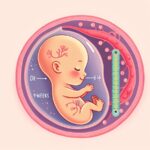Reaching the halfway mark in your pregnancy journey is both an exciting and challenging time. Mid-pregnancy symptoms and care at week 19 are pivotal for many expectant mothers, as they navigate through a mix of changes and anticipations. This stage is crucial for both maternal and fetal health, making understanding and managing symptoms of utmost importance.
Understanding Mid-Pregnancy Symptoms at Week 19
As you step into week 19 of your pregnancy, your body undergoes significant changes that can bring about various symptoms. It’s essential to recognize these mid-pregnancy symptoms and care techniques to ensure both you and your baby’s well-being. Common symptoms during this period include increased appetite, mild swelling of the ankles and feet, occasional dizziness, and the exciting movement of your baby, which many women start to feel around this time.
Understanding these symptoms is crucial for managing them effectively. Regular exercise, balanced nutrition, and adequate rest are key factors in minimizing discomfort. Additionally, staying hydrated and wearing comfortable clothing can significantly contribute to your overall comfort during this period.
Mid-Pregnancy Symptoms and Care at Week 19
At week 19, mid-pregnancy symptoms and care should be carefully monitored and managed. This period often marks the beginning of more pronounced fetal movements, known as ‘quickening’. The sensation of your baby moving is not only a sign of their growth and health but also a reminder of the incredible journey your body is undertaking.
To manage these symptoms and ensure your comfort, consider incorporating gentle exercises such as prenatal yoga or swimming into your routine. These activities not only help with symptom management but also prepare your body for childbirth. Furthermore, regular prenatal check-ups during this stage are crucial to monitor your baby’s development and catch any potential issues early.
Nurturing Your Body and Mind
Taking care of your mental health is as important as physical care during mid-pregnancy. The mid-pregnancy symptoms and care at week 19 include emotional fluctuations that are common due to hormonal changes. Engaging in stress-reducing activities, such as meditation or spending time in nature, can greatly benefit your emotional well-being.
Eating a well-balanced diet rich in vitamins and minerals is essential for supporting your body’s needs and promoting fetal development. Foods high in omega-3 fatty acids, calcium, iron, and folic acid should be included in your daily intake. Remember, taking care of your nutritional needs during pregnancy not only benefits you but also plays a crucial role in your baby’s health.
In conclusion, mid-pregnancy symptoms and care at week 19 require a balanced approach that includes physical health, emotional well-being, and nutritional support. By understanding and addressing the common symptoms of this stage, you can ensure a smoother journey through the second trimester. Remember, every pregnancy is unique, so it’s important to consult with your healthcare provider to tailor the care that’s right for you and your baby.
For more information on pregnancy care and symptoms at different stages, visit Mid-Pregnancy Symptoms and Care at Week 19.













